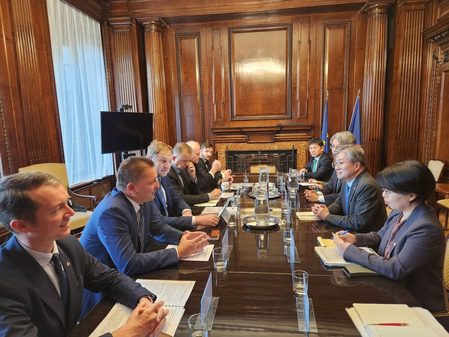
Seoul, Sep 25 (IANS) Senior diplomats of South Korea and the Czech Republic have agreed to work closely together to ensure the smooth completion of the South Korea-led construction of two nuclear power plants in the European country, Seoul’s foreign ministry said Thursday.
The two countries have finalised the estimated US$18 billion project after overcoming long-standing legal hurdles involving foreign rivals, and have begun initial work to launch construction in Dukovany, in the Czech Republic’s southern region.
Kim Hee-sang, deputy foreign minister for economic affairs, discussed the project with David Muller, director general for the European Union and foreign trade section of the Czech Ministry of Industry and Trade, during their sixth Economic Joint Committee in Prague on Wednesday (local time).
“They assessed the timeline for the construction and agreed to work closely together to ensure the construction of the nuclear power plants will proceed without delays,” the ministry said in a release.
They also agreed to deepen cooperation in advanced technologies, such as semiconductors, electric cars and batteries, as well as expand the partnership in the defence industry and energy transition, reports Yonhap news agency.
During the visit, Kim also met with Katerina Sequensova, deputy foreign minister for non-European countries, economic and development cooperation, and discussed efforts to strengthen economic cooperation in trade and investment.
In a separate development, the nuclear watchdog was set to decide Thursday whether to extend the lifespan of the 42-year-old Kori-2 nuclear reactor for an additional 10 years.
At its meeting, the Nuclear Safety and Security Commission (NSSC) will review a request from the Korea Hydro and Nuclear Power Co. (KHNP), the state-run power operator, to restart and operate the reactor past its initial 40-year period.
This marks the first of 10 life extension requests by the KHNP for its ageing reactors and is widely expected to serve as a barometer for the fate of the other nine reactors.
The 650-megawatt Kori-2 lightwater reactor on South Korea’s southeast coast started commercial operation in April 1983. It is the country’s oldest active reactor, aside from the Kori-1 and Wolsong-1 reactors, which have been permanently shut down.
The Kori-2 has been offline since April 2023, when its initial 40-year operating license expired.
If approved, the reactor will operate until April 2033.
It would also become the first nuclear facility in South Korea to receive a lifespan extension since 2015, when the Wolsong-1 reactor was allowed to resume operations.
The outcome of the Kori-2 case is expected to set a precedent for nine other ageing reactors. Among them, Kori-3 and Kori-4 have already been suspended, while seven others are set to reach the end of their operating lives by 2030.
Experts note their possible extensions or resumptions could help boost the country’s power supply.
President Lee Jae Myung has said his government will continue using existing nuclear reactors as part of a “reasonable energy mix,” even as it maintains its opposition to building new ones.
South Korea has 26 nuclear reactors in operation, from which it currently gets about 30 per cent of its electricity supply.
–IANS
int/sd/




